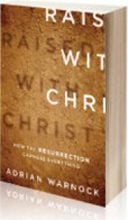Back in June I was blogging on The new pespective on Paul and said something that has great relevance to our debates on substitutionary atonement
I have a great deal of skepticism of any theological view that does not naturally arrise from the biblical texts. As helpful as scholars can be the bible was written for the common man. Much of it (especially the epistles) is a bit like listening to one side of a telephone conversation. But, God knew that when he designed the bible as a book for all time and all peoples. Thus, scholars should enrich our understanding of the bible rather than generally contradict the message that comes accross loud and clear to English readers. I am skeptical of any theological position that depends on extensive word studies to try and prove that individual words didnt mean what we think they did.
In fact due to the principle of redundancy in communication, our theologies ought to be able to survive a random elimination of words or even whole verses in the bible. Thus, if a theology rests on a single word, I would argue what if that word were deleted from the bible, what conclusions would we come to then? The clear message of the bible is not dependent on any one word in it.
We study the WHOLE bible, and to my mind it is full of references to sin, judgement, punishment for sin, guilt and redemption by paying a cost or a sacrifice. I remain confident in traditional interpretations of the gospel and challenge any of my readers to undermine such understandings without the use of greek lexicons to try and change the meaning of words.












